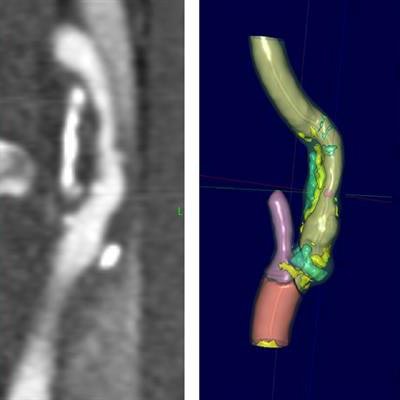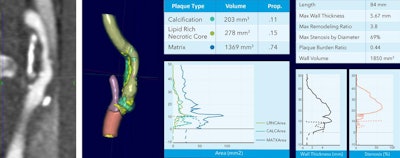
Artificial intelligence (AI) software developer Elucid Bio is highlighting a study showing that its vascuCAP AI algorithm was about 70% more accurate in predicting strokes than stenosis-based methods over a six-year time period.
Researchers from the University of Maryland's Center for Vascular Diagnostics and the U.S. National Institute of Health Vascular Imaging Core Facility sought to improve the prediction of major adverse neurological events, including stroke, transient ischemic attacks, and amaurosis fugax by applying Elucid Bio vascuCAP software to traditional carotid imaging.
 At left is a CT scan of the carotid artery. On the right, Elucid Bio's vascuCAP software transforms the scan into a 3D visualization and quantitation of plaque tissue composition and structural measurements. vascuCAP was validated in the CRISP trial to inform highly accurate prediction of major adverse neurological events such as stroke. Image courtesy of Elucid Bio.
At left is a CT scan of the carotid artery. On the right, Elucid Bio's vascuCAP software transforms the scan into a 3D visualization and quantitation of plaque tissue composition and structural measurements. vascuCAP was validated in the CRISP trial to inform highly accurate prediction of major adverse neurological events such as stroke. Image courtesy of Elucid Bio.The findings indicate that vascuCAP's algorithms for risk stratification in carotid atherosclerosis are better predictors of stroke than stenosis assessment alone, according to the company. The technology, which is in clinical use, could improve risk assessment for stroke, including patients diagnosed with COVID-19, according to the findings.
The interim results will be presented at the Society for Vascular Surgery Online Summer 2020 conference on July 2.



















